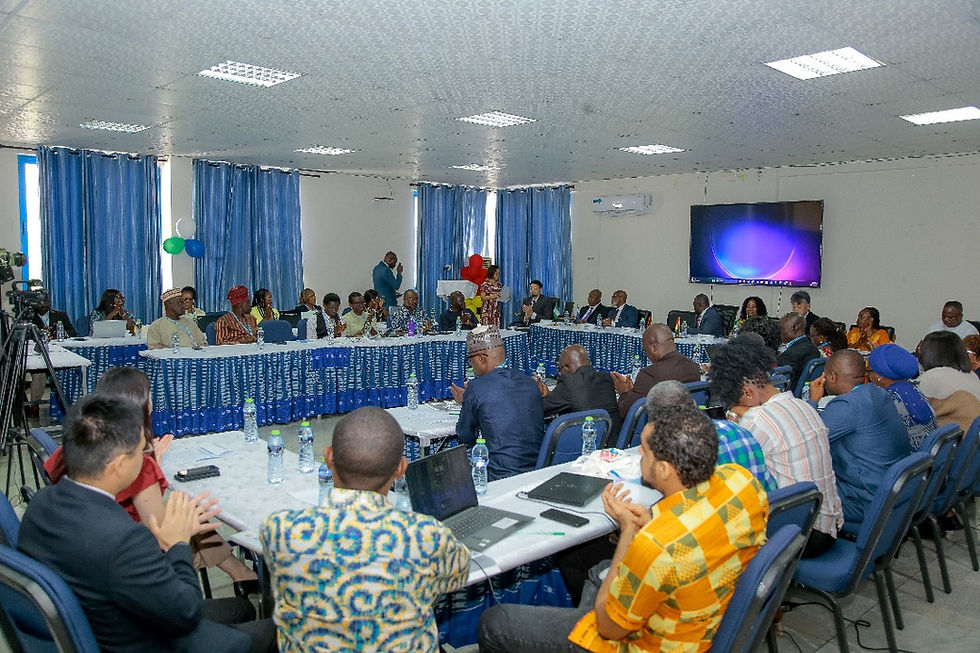African Development Bank, takes proactive measures to combat corruption across continent
- Think News Online
- May 8, 2024
- 3 min read

In a compelling address at a recent conference, Mariame Krauer-Diaby, Principal Anti-Corruption and Governance Officer at the Economic Governance and Public Reforms Departement of the African Development Bank (AfDB) has shed light on the pivotal role of the bank in tackling corruption across Africa.
Ms. Krauer-Diaby emphasized the urgency of addressing corruption as a fundamental challenge hindering Africa's development trajectory.
Ms. Krauer-Diaby began by underscoring Africa's sobering reality, citing the 2023 Transparency International's Corruption Perception Index where only five countries out of 54 in Africa scoring above 50 with 31 countries showing no improvement or declining since 2022.
Against this backdrop, the AfDB's commitment to combat corruption emerges as a beacon of hope.
Ms Krauer-Diaby delineated the multifaceted impact of corruption, ranging from hampering economic growth to exacerbating social inequality and political instability.
Recognizing corruption as a major obstacle to poverty alleviation and improved living standards, Mariame articulated the moral imperative driving the ADB's anti-corruption agenda.
Central to the AfDB's strategy is the integration of anti-corruption measures into its projects, ensuring that development funds are utilized efficiently and transparently.
Madam Krauer-Diaby elucidated the AfDB's comprehensive approach, encompassing policies, strategies, and collaborations aimed at fostering good governance and accountability.
Emphasizing the significance of collaboration, Krauer-Diaby highlighted the AfDB's partnership with various stakeholders, including national governments, anti-corruption agencies, and international organizations like the UN Office on Drugs and Crime (UNODC) , OECD and the World Bank.
"Such partnerships facilitate coordinated efforts and resource leverage to maximize impact"
Krauer-Diaby delved into the operational modalities of the AfDB's anti-corruption initiatives, ranging from program-based budget support to institutional support projects tailored to meet specific country needs.
"Notably, the AfDB's engagement is rooted in country ownership, with interventions designed in consultation with national authorities and responsive to local priorities"
"Highlighting concrete examples of the AfDB's interventions, Ms Mariame cited ongoing projects in Mali, Côte d’Ivoire, South Sudan, Liberia, and other countries, where the AfDB is providing technical assistance, capacity building, and policy support to strengthen anti-corruption efforts"
In addition to country-level interventions, Ms. Klauer outlined regional initiatives, such as promoting business integrity and collaborating with international bodies like the OECD to combat bribery and illicit financial flows.
In conclusion, Krauer-Diaby reiterated the AfDB's unwavering commitment to combatting corruption as integral to its mandate of promoting sustainable development in Africa.
With a blend of strategic policies, targeted interventions, and collaborative partnerships, the AfDB stands at the forefront of the fight against corruption, poised to catalyze positive change across the continent.

In a riveting discourse, Youssoupha Ndiaye, Principal Integrity Officer at the African Development Bank (AfDB), unveiled the pivotal role of the Integrity Office in the Bank’s relentless pursuit of transparency and accountability.
Addressing an audience at the 14th Commonwealth Regional Conference for Heads of Anti-Corruption Agencies in Africa held in Accra, Mr. Ndiaye underscored the profound impact of the AfDB’s collaborative efforts in combating corruption across Africa.
Ndiaye commenced by highlighting the core functions of the Integrity Office, Ndiaye elucidated its mandate, which revolves around preventing and detecting prohibited practices within AfDB-financed operations.
Central to the Integrity Office’s modus operandi is collaboration, particularly with national anti-corruption agencies.
Mr. Ndiaye emphasized the symbiotic relationship between the AfDB and these agencies, leveraging expertise, resources, and a shared commitment to transparency and good governance.
“Through mechanisms such as Memoranda of Understanding (MOUs), the AfDB and anti-corruption agencies exchange best practices, conduct joint investigations, and bolster capacity building efforts"
Ndiaye delved into the intricacies of the AfDB’s sanction system, highlighting its role in addressing prohibited practices.
Furthermore, the AfDB’s sanctions include restitution and other financial remedies where there is a quantifiable amount to be restored to the AfDB or to the country.
The scope of collaboration extends beyond national borders, with the AfDB forging MOUs with regional agencies and international organizations.
“These partnerships facilitate knowledge exchange and capacity building initiatives, exemplified by training programs conducted in collaboration with institutions like the Commonwealth Africa Anti-Corruption Centre”
Transparency emerges as a cornerstone of the AfDB’s ethos, with Mr. Ndiaye spotlighting the bank’s commitment to openness and beneficial ownership disclosure.
“By making project data accessible online and advocating for transparent ownership structures, the AfDB cultivates a culture of accountability and scrutiny.
In conclusion, Mr. Ndiaye reiterated the AfDB’s unwavering commitment to combatting corruption and promoting transparency.
“Through strategic collaborations, robust sanction mechanisms, and a steadfast dedication to openness, the AfDB’s Integrity Office stands as a beacon of integrity, driving positive change and fostering sustainable development across Africa”
Story by: Joshua Kwabena Smith








Comments